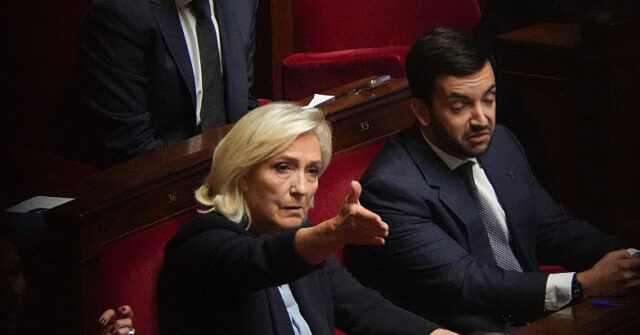The French Prime Minister narrowly avoided having his government collapsed for a second time in two weeks in a Parliamentary vote on Thursday, prompting the left-wing opposition to say they’ll try and impeach Emmanuel Macron directly to bring him down.
Sébastien Lecornu, the now-two times French Prime Minister whose first government lasted just 12 hours last week faced two censure votes on Thursday morning — the French equivalent of a vote of no confidence which, if passed in the National Assembly, dissolves the government — by a narrow margin. Rebels needed 289 votes in the house of 577 and fell just short with 271 votes counted for dissolution in the first round.
The failure to bring down the government on this occasion is, by this point, notable for French politics which has become unmanageably fractured, unstable, and to the eyes of some now stumbling towards the need to re-write the constitution and declare a new Republic. Emmanuel Macron has now presided, as President, over nine consecutive cabinet governments under a multitude of Prime Ministers, a record since the 13-year-rule of François Mitterrand in the 1980s and 90s.
Portrait of France s Prime Minister Sebastien Lecornu while he is speaking at the podium, Joint discussion and vote on two motions of no confidence (censure) against the new Lecornu government tabled by the opposition groups La France Insoumise LFI and the Rassemblement National RN pursuant to Article 49, paragraph 2, of the Constitution, in the chamber of the National Assembly in Paris, France on October 16, 2025. (Photo by Amaury Cornu / Hans Lucas via AFP) (Photo by AMAURY CORNU/Hans Lucas/AFP via Getty Images)
Yet even the dynamics of today’s votes clearly map onto the deep divisions in French politics which manifest in the composition of the Assembly, which leave it unable to build functional governing coalitions.
The largest party in French politics today is Marine Le Pen’s sovereigntist National Rally, which mixes right-wing ideas on border controls and national sovereignty and left-wing on government spending, welfare, and taxes. Le Pen is a leading voice against President Macrons’ centrist rule but no party of the left — who consider her the greater enemy — will cooperate on a National Rally initiative to bring down Macron or his government.
Speaking before the vote, Marine Le Pen said “This isn’t a political crisis, it’s a crisis of politicians, a crisis of tired old parties” created by their wrecking of political norms to keep her soverientrist party coming to power by any means.
Consequently, the motion considered most likely to have been able to succeed today was one brought by the rainbow leftist coalition La France Insoumise (France Unbowed, ‘LFI’). Yet it faltered because one of France’s constellation of small left-wing parties — who sometimes get along but quite often do not — was successfully bought off by the pro-Macron Lecornu government with promises to delay pension reform.
This party, the Socialists, came in for harsh criticism from its left-wing stable mates for having been bribed into keeping Lecornu in power and saving Macron’s skin. LFI founder Jean-Luc Mélenchon said had his motion had just 18 more votes Lecornu would have gone and the pressure for Macron to step down as President would have soared. Instead, he was “narrowly saved”, he said.
LFI responded to today’s failure by invoking “popular and parliamentary resistance” and saying instead of calling another censure vote to bring down the cabinet, they would simply go directly for the President himself by attempting to impeach. They said in a statement: “[we] rebels want to identify and openly fight the person responsible for this situation: President Macron. He must go. We will therefore submit a new resolution to the National Assembly, along with the [left wing alliance] parliamentarians, with a view to his impeachment.”
The socialists, and the Macronist coalition that voted to save the government today also came in for criticism from the right. Jordan Bardella, Le Pen’s protégé who will take over as the National Rally’s sovereigntist candidate for the Presidency should present legal bids to ban Le Pen from standing for election at all succeed said “bargaining” had saved Macron, but this had come at the expense of the national interest.
“All those who today refused censorship will be responsible for the country’s forthcoming suffering”, Bardella warned.
Much of the focus of opposition parties is on calling for fresh elections in the hope this would break the parliamentary deadlock in favour of their own faction. This could happen, but the divisions in French politics and the nation’s peculiar electoral system may entrench the mutually-loathing blocs in the Assembly further, without developing any working majority or scope for cooperation. It is for this that many observers, both domestic and foreign, speak openly of France stumbling towards the bloodless revolution of a new constitution and electoral system. As previously reported:
At the heart of the political turmoil in Paris today is Macron’s ill-advised decision to call for snap legislative elections in July 2024 in the wake of his party’s trouncing in the EU Parliament by Marine Le Pen’s National Rally the month prior. With the populist party having come out on top of the first round of voting and threatening to take control of the National Assembly, Macron made the Machiavellian calculation of forming a strategic voting pact with the leftist New Popular Front to keep Le Pen and her allies from taking power.
Yet all these manoeuvres managed to achieve was a three-way split in the parliament, which has effectively made governing functionally impossible, with no faction having the requisite votes to pass a much-needed budget as the country stares down the barrel of a full-on debt crisis.
Read the full article here


